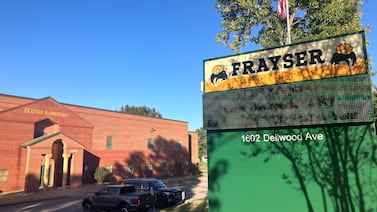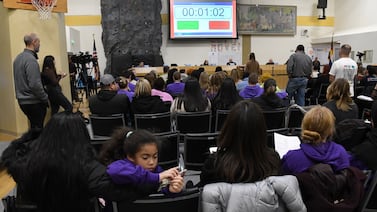Sign up for Chalkbeat Detroit’s free newsletter to keep up with the city’s public school system and Michigan education policy.
The Detroit school district’s board voted this week to share privileged information with the state if a mass casualty event occurs in order to receive $7.2 million in state funding – a move many other Michigan school leaders are objecting to.
This year’s state education budget added a condition to dollars local districts can use to pay for mental health support, intervention for at-risk students, and school safety measures. In order to get the money, districts must agree to disclose information that would otherwise be legally protected in deadly emergencies, such as school shootings. Districts must also agree to comprehensive state investigations.
Districts have until Nov. 30 to approve the waiver and apply for the per-pupil funds.
The waiver comes after parents of Oxford High School students killed in 2021 pushed for a state investigation of the district’s alleged failure to prevent the shootings. Though an independent investigation found multiple failures by school officials, many employees did not participate in the review.
Michigan’s government immunity laws shield educational institutions from liability in lawsuits, unless a high threshold of gross negligence can be proven. The laws can also protect institutions’ employees. Without immunity, school employees could be held legally and financially liable for failing to prevent deaths.
There has been a movement in Michigan to lower the threshold for negligence and take away immunity from schools that do not properly follow emergency operations plans.
In addition to the Detroit Public Schools Community District, the Lansing School District also approved the waiver.
DPSCD Superintendent Nikolai Vitti told Chalkbeat in an email that the district had concerns about the conditions, but it “could not afford to walk away from $7.2M dollars that assist in funding our contracted nurses and mental health for students, and full time security employees at schools.”
He added that “losing that funding would have had a direct negative impact on our students.”
Twenty-two districts and 11 regional educational service agencies sued the state this week, challenging the constitutionality of the waiver attached to the funding.
The complaints, filed in federal and state courts, request emergency relief by the end of the month. The plaintiffs argue the law could force schools to give up funding for counselors, social workers, and security infrastructure.
“The provision imposes an unconstitutional condition by leveraging essential public funds in exchange for the waiver of fundamental individual rights,” the complaint reads.
Seven education organizations, including the Michigan Association of Superintendents and Administrators, asked the legislature in a letter last month to change the language of the bill to require districts to cooperate with investigations but allow them to preserve legal privileges.
The groups argued the waiver could prevent districts from discussing crisis responses in closed sessions and protecting records from being released to the public.
Leaders in other districts, such as Southfield Public Schools and Hazel Park Schools, opted to take more time to consult with attorneys at recent board meetings.
The state’s historic mental health and safety grants, created in 2022-23, were praised as a step to address school security issues in the aftermath of the Oxford shootings.
In DPSCD, the grants are used to continue nursing services that had been funded by now-expired federal COVID relief dollars. The dollars are also used to pay for contracted mental health support at all of its schools and to partially fund security guards and officers.
According to a fiscal analysis, the district would lose $5.5 million in grants this school year and an additional $2 million carrying over into 2026-27.
The Detroit school board voted unanimously at Tuesday night’s meeting to comply with the waiver and share all information with a governor-appointed investigator if there is a mass casualty event.
The board did not publicly discuss the waiver before the vote at the meeting.
Hannah Dellinger covers Detroit schools for Chalkbeat Detroit. You can reach her at hdellinger@chalkbeat.org.





